President Zoran Milanović: Social Care Must Be a Separate Department
ZAGREB, 7 April, 2021 - President Zoran Milanović said on Tuesday that people in charge of the social care system should admit mistakes and take the responsibility for the death of a two-and-a-half-year-old girl caused by domestic violence, adding that there should be a separate government department for social care.
"Yet another tragedy, the death of a girl from Nova Gradiška, caused by domestic violence, has again raised the issue of the efficiency and quality of the social care system in Croatia, in particular care for children," Milanović wrote on Facebook.
He said that this case, for which full responsibility is yet to be established, requires a "serious, systematic and immediate intervention" in the regulation governing social care for those most vulnerable, the children.
"It is questionable whether the present system, which is neglected, can achieve that. The fusion of government departments to give an impression of efficiency has brought about even greater negligence and an absence of supervision from the political, ministerial level," the President said.
He expressed hope that the people in charge of the social care system would have the strength to admit mistakes and take the responsibility, adding that this would be a clear signal that they recognised the problem and wanted to deal with it.
He said that the Ministry of Labour, Pension System, Family and Social Policy should finally start listening to and respecting the opinions and advice of educated and experienced people in caring for the wellbeing of children. The laws and regulations that will be enacted in the future must give priority to children's safety, Milanović said.
He concluded by saying that he was deeply convinced that social care should be a department unto itself rather than integrated into a "non-functioning mega-ministry" as was now the case.
For more about politics in Croatia, follow TCN's dedicated page.
Party Tourism in Novalja No Longer the Focus, More Content for Locals Announced
April 7, 2021 - Renowned for Zrće Beach and the partying that goes on there, party tourism in Novalja is no longer in focus, as the mayor is shifting towards content for the local community.
Novalja on Pag island is one of Croatia's biggest hotspots to visit over summer. Zrće Beach is a world-renowned synonym for partying and all the crazy fun things that come with sipping cocktails on the beach next to the clear Adriatic Sea at any time of the day while some of the biggest names of the international DJ and music scene are in their finest element.
Still, as the Croatian tourist offer, in general, tries to break out of the perception that Croatia is great „only for summer“ and also tries to popularise other parts of the country that are a bit further from the coastline, Novalja is on a mission of its own - to break the stereotype that „it's just for partying“.
As Večernji List reports, Ante Dabo, the mayor of Novalja for two the past two terms, is more than aware that Zrće is vital to Novalja's tourism, but the town is heavily working to offer more content to visitors.
„From 2017 to 2019, we invested 48 million kuna in capital projects and despite the coronavirus pandemic, we invested 51 million kuna in 2020 alone“, said Dabo for Večernji List.
One of such projects is using the town's own funds for the Grozdenica culture centre. This new centre is imagined to be the core of cultural events in Novalja, and given it's a multifunctional hall with 210 seats and a stage with the most modern equipment, there is no doubt it will spot on for hosting cinema screenings, conferences, concerts, and theatre plays.
The new port and Marina are also part of the branding scheme to further position Novalja by attracting nautical tourism.
„We reduced taxes so new hotels could be easily opened, but we will allow building hotels that have less than four stars. We want quality hotels that will accept guests in the winter months to extend the season. We relied more on private accommodations but we also have hotel capacities of high standards and 600 more beds in comparison to 2019“, said Dabo commenting on changes in urban planning that forbids building hotels that have less than four stars.
The mayor also adds how Pag has rich cultural and archaeological findings along with heritage, natural wonders tracking, and bike tracks for recreational tourism.
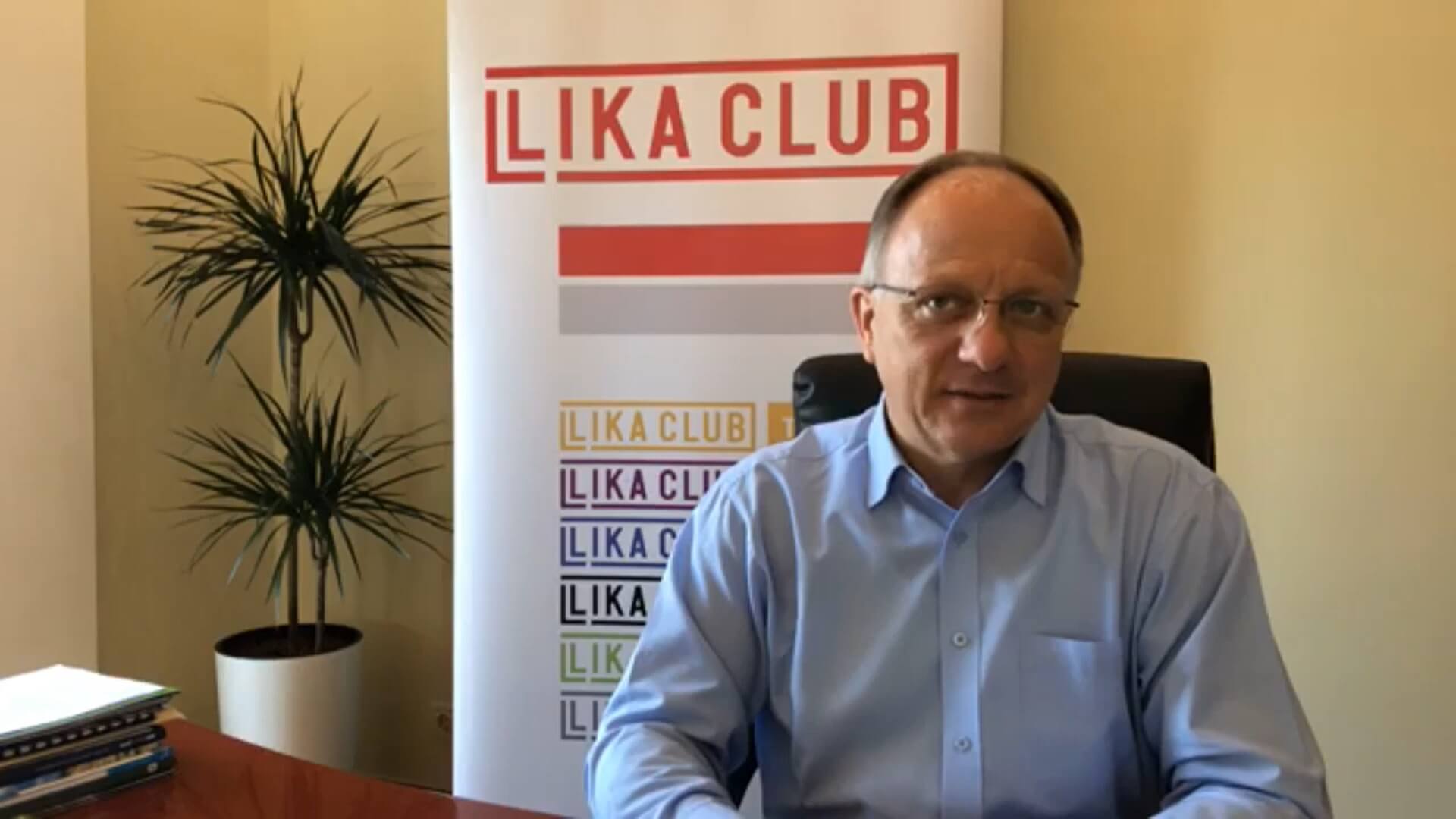
Ante Dabo screenshot / LIKA CLUB
Caring for locals and not just for visitors
Zrće brings money, Zrće is a party hotspot, and Zrće is also loud and a threat to the peace of locals who don't visit clubs and events themselves. As Večernji List reminds, Dabo became known to the broader public in Croatia for introducing rules of conduct for tourists and for reducing the noise from Zrće.
„Zrće is too big of a brand to say it's not needed for Novalja, but everyday activity on Zrće needs to be reduced. That's the solution to compromise for party people and for other guests who are interested in a more peaceful vacation“, said Dabo referring to Novalja's need to escape from the monoculture of partying.
Locals are happy too as Novalja has the biggest budget when counted by the number of residents in all of Croatia, according to the Institute of Public Finance. A lot is also done for young families. By further rebuilding the kindergarten, Novalja will have more significant capacities to take care of the kids while parents are working. A low-energy building was built with the partial help of the EU funds, and the firefighter station is being reconstructed (also by EU funds) to ensure every service for protection and rescue can be in one place. The EU project of developing an entrepreneur zone Čiponjac worth 10 million kuna is also done, an entrepreneur incubator Ragan worth 12.5 million kuna, and a design to boost local-level entrepreneurship recently started, too. Business spaces are offered to new and young entrepreneurs at affordable prices.
The biggest project for Novalja, however, is Aglomeracija Novalja, which enhances agglomeration and water infrastructure with a new biological purifier for wastewater. Fifty kilometers of pipes are incorporated in the new sewer system that stretches through Metajna, Barbat, and Stara Novalja to the new purifier in the Vrtić district. Aglomeracija Novalja, worth 72 million kuna, and financed by EU funds up to 72%, makes Novalja a small town that is revitalizing, despite the corona crisis.
Learn more about Novalja and the island of Pag on our TC Page.
For more about travel in Croatia, follow TCN's dedicated page.
Rovinj Tourist Board Provides PCR Tests for Guests in Private Accommodation
April 7, 2021 - In order to promote safe tourism during the pandemic, the Rovinj Tourist Board provides PCR tests for guests staying in private accommodation.
As reported by IstraIN.hr, in order to facilitate the stay of guests in Rovinj and make their stay safer, the Rovinj Tourist Board has decided to ease the situation for private renters and guests, since they need a negative PCR test to avoid quarantine to return home.
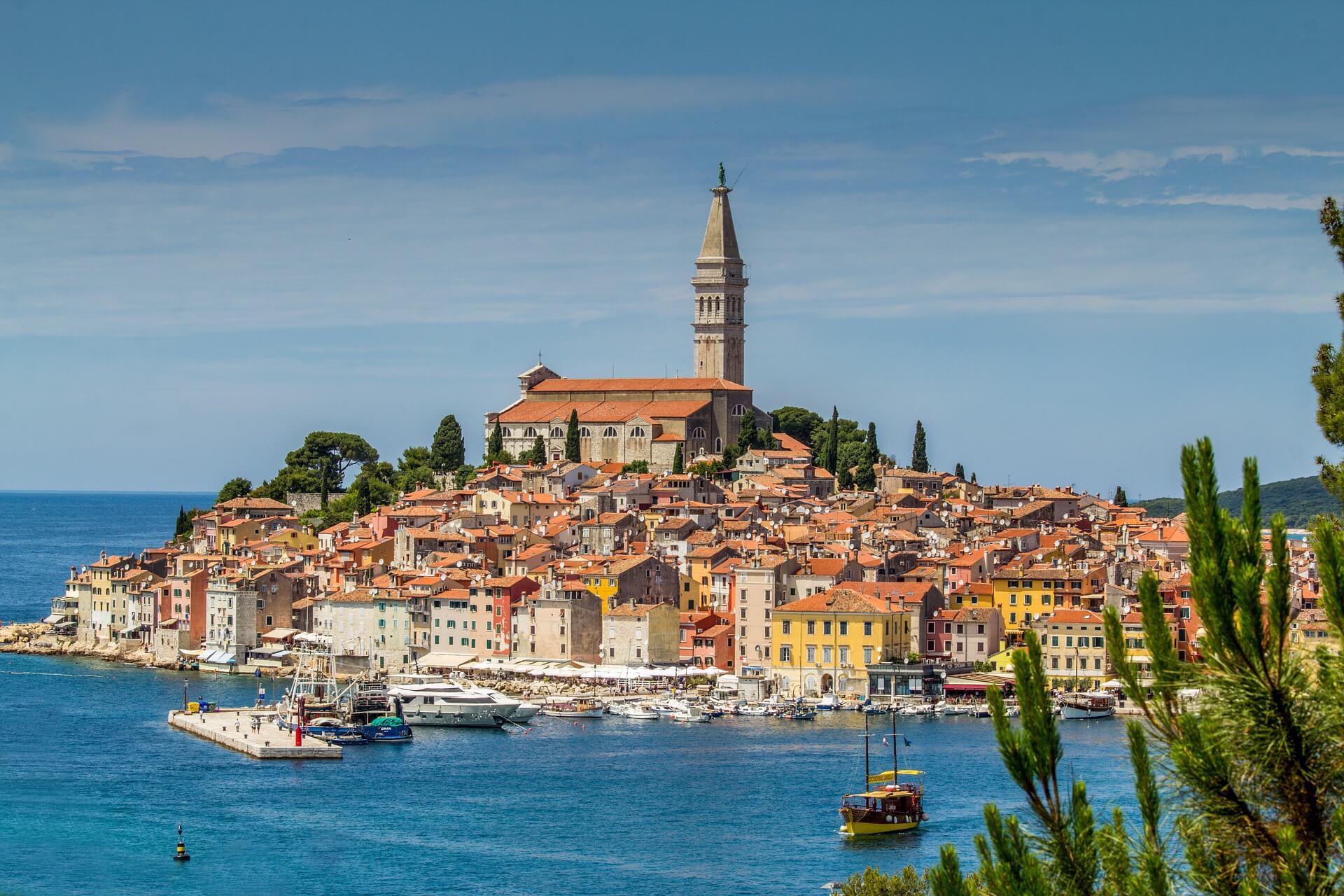
Credit: Gerald Thurner (Pixabay)
Even if new flight routes are being opened and the frequency of these are increasing as the summer season approaches, many of the tourists traveling to Croatia have to deal with the measures imposed in their own countries upon their return. For instance, tourists from many European countries had to cancel their reservations during last summer season due to the quarantine measures imposed by their governments.
As the world was hit by the third wave of the pandemic, many countries were forced to tighten measures further. Among them are numerous European countries such as Germany, which have declared Istria as a high-risk region, despite the fact that Istria is still among the European regions with the lowest incidence of infection.
On that occasion, the Rovinj Tourist Board has provided testing for guests staying in private accommodation and other smaller facilities. Testing is performed in Maistra hotels, and to register guests will need to contact the Rovinj Tourist Board by phone at +385 52 811 566 or e-mail to This email address is being protected from spambots. You need JavaScript enabled to view it..
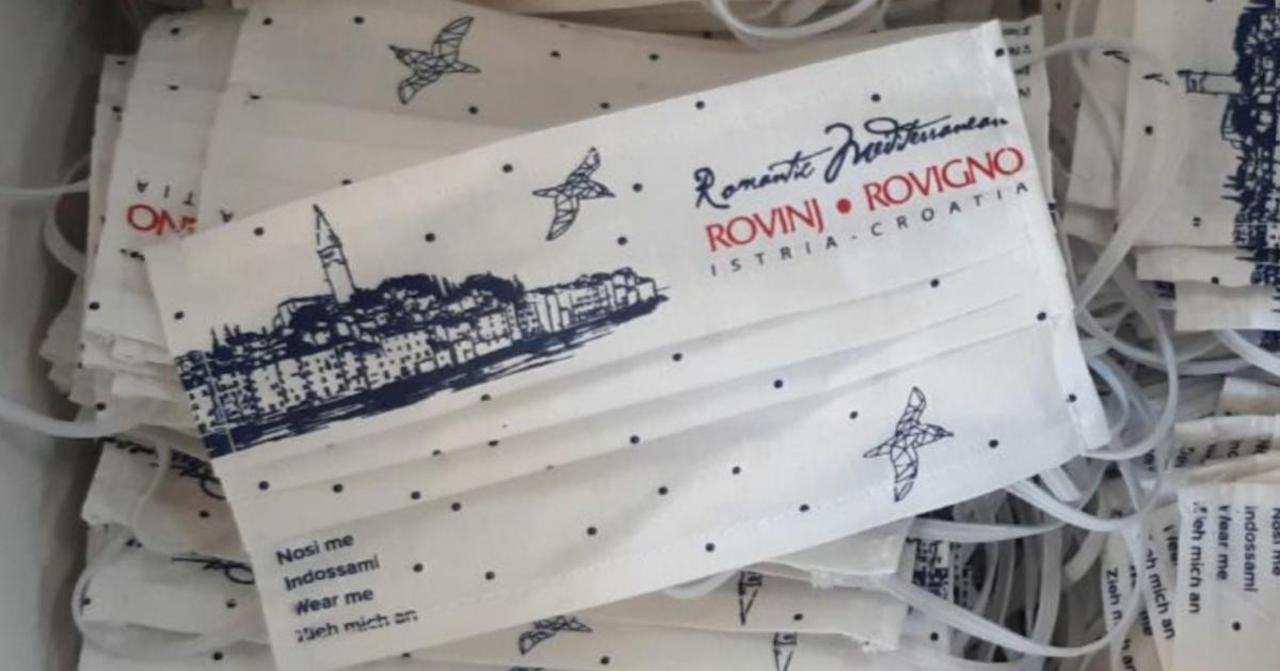
Credit: Rovinj Tourist Board
Last year the Tourist Board designed its own protective canvas face mask, which was distributed to catering employees and registered private landlords. The mask served not only as a safety measure but as an attractive souvenir for many guests as well.
In addition to masks, the Tourist Board has made a leaflet or brochure "Info COVID-19" which is intended for guests and renters, to inform guests about the procedure in case of coronavirus infection during their stay in the accommodation facility. You can find it below:
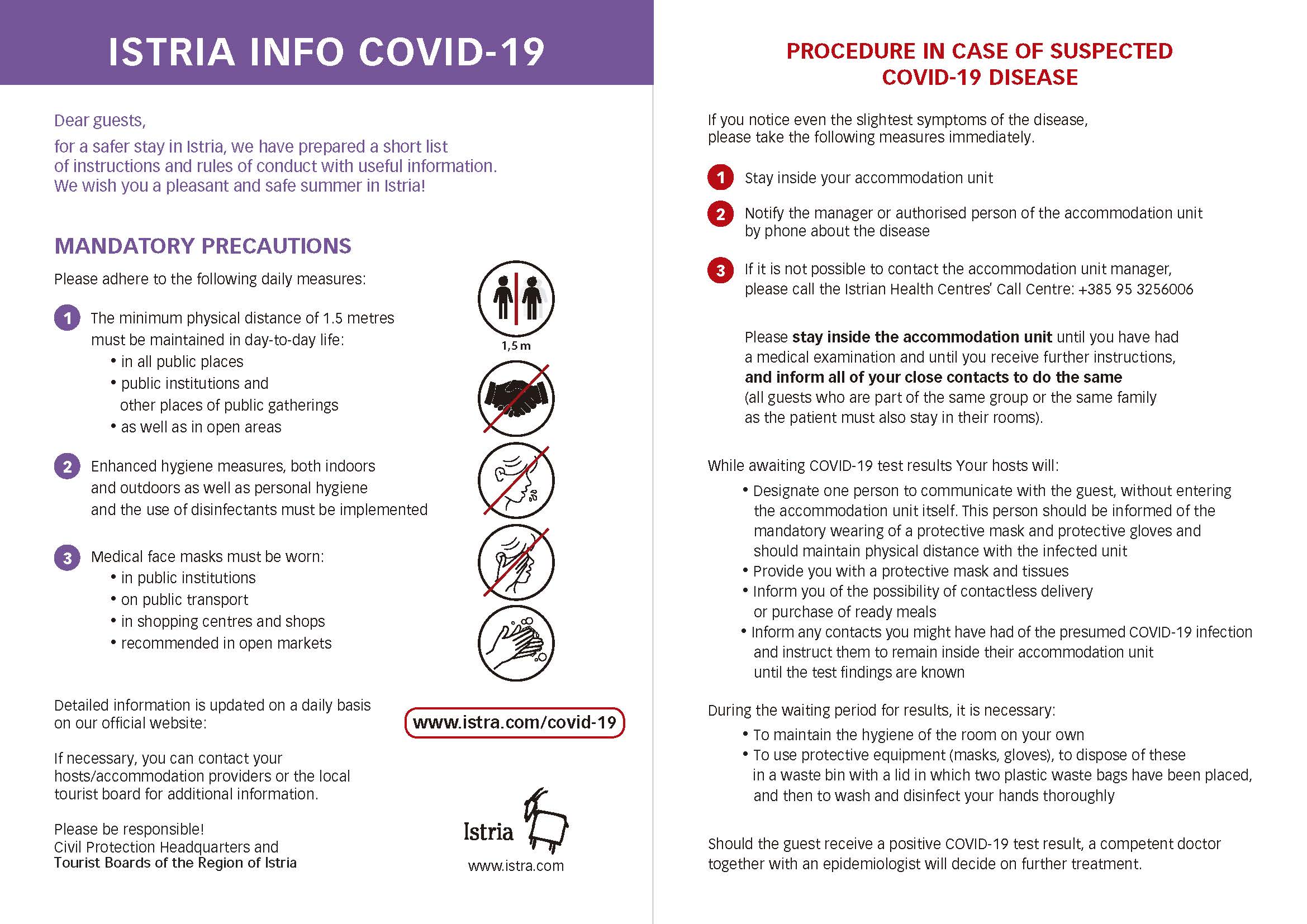
All you need to know about traveling to Rovinj can be found on our dedicated TC page.
Follow the latest travel updates and COVID-19 news from Croatia HERE.
For more on travel in Croatia, follow TCN's dedicated page.
Norwegian Air Flights to Croatia: 14 Routes Planned for Summer 2021!
April 7, 2021 - The latest flight news as travelers can choose from 14 Norwegian Air flights to Croatia this summer!
Croatian Aviation reports that Norwegian low-cost airline Norwegian Air plans to operate 14 routes to three Croatian airports this summer.
Norwegian plans to resume traffic to three Croatian airports from June this year; Pula, Split, and Dubrovnik. Before the outbreak of the global pandemic, the airline operated to Zadar, Rijeka, and Zagreb.
The airline had a minimal number of international lines to Croatia in the summer season of 2020. It is common knowledge that this low-cost carrier was in financial trouble even before the outbreak of the global pandemic. In January, there was news that this carrier would cancel all long-haul lines and focus on those within Europe.
In addition to being a pioneer in low-cost, long-haul lines, Norwegian had an extremely high-quality product, and passengers were delighted with the ratio of paid and received. One of the great marketing moves was the introduction of free internet on all Norwegian lines, but the rapid expansion led almost to its very collapse.
However, Norwegian is trying to consolidate and plans to operate to three Croatian airports, Pula, Split, and Dubrovnik, in this year's summer flight schedule. There has been no line to Rijeka or Zagreb for a long time.
Although in 2019 the number of routes to Croatian airports was significantly higher, given the current global situation, reduced passenger demand, and the state of this airline, 14 planned routes to Croatia for the summer of this year sounds more than good. Of course, given the movement of the global pandemic, there is a possibility that Norwegian will further reduce its flight schedule.
However, they have confirmed that they plan to operate on the routes below:
Oslo - Pula from June 2, 2 times a week, Wednesdays and Saturdays,
Bergen - Split from June 19, twice a week, on Tuesdays and Saturdays,
Copenhagen - Split from June 1, 2 times a week, daily from June 28,
Helsinki - Split on June 2, 3 times a week, on Mondays, Wednesdays, and Fridays,
Oslo - Split from June 1, 3 times a week, daily from June 25,
Stavanger - Split from June 22, 2 times a week, Tuesdays and Saturdays,
Stockholm - Split from June 2, 2 times a week, 5 times a week from June 21,
Trondheim - Split from June 19, once a week, on Saturdays,
Bergen - Dubrovnik from June 19, once a week, on Saturdays,
Copenhagen - Dubrovnik from June 26, twice a week, on Tuesdays and Saturdays,
Helsinki - Dubrovnik from June 1, twice a week, on Tuesdays and Saturdays,
Oslo - Dubrovnik from June 1, 2 times a week, daily from June 25,
Stavanger - Dubrovnik from June 19, once a week, on Saturdays,
Stockholm - Dubrovnik from June 12, 3 times a week, on Mondays, Wednesdays, and Saturdays.
Given the problems that Norwegian has found itself in the past few years, it is quite difficult to expect that they will really operate on all of these lines. In the summer of 2020, Norwegian had only three routes to Croatia, two to Split, and one to Dubrovnik. With the current epidemiological situation in Europe, we can hardly expect a sharp increase in passenger demand in June. There are less than two months left until its first flight to Croatia.
Follow the latest on flights to Croatia HERE and the latest travel updates and COVID-19 news from Croatia HERE.
For more on travel in Croatia, follow TCN's dedicated page.
Opening of Fascinating New Dugi Otok Hotel to Attract Attention
April the 7th, 2021 - The opening of the doors of a very interesting new Dugi Otok hotel is set to attract a lot of attention despite the ongoing pandemic and the difficulties both business and tourism continue to face.
As Poslovni Dnevnik/Marta Duic writes, the brand new Dugo Otok hotel, more precisely Villa Nai 3.3 in Zman, is on course to open its doors on May the 28th this year. The conceptual design of the building was designed by academician Nikola Basic back in 2013, and it was designed on isohypsis, which gives it an unexpected and deeply unusual geometric shape.
This is a project that received support from measure 4.2 and was created with the support of both the HBOR and the ESIF loan through HAMAG-BICRO.
As Goran Morovic explained, who, in addition to the production of organic olive oil, is also entering the tourism business with the opening of this new Dugi Otok hotel, it is a facility surrounded by a thousand olive and other fruit trees. The yard of the building stretches out for about four hectares, and their family farm normally takes care of six of those hectares.
“Villa Nai 3.3 is an exceptional architectural and construction achievement, designed by academician Nikola Basic. It's a facility that fits perfectly into the landscape of the island and the microlocation inside the olive groves. Under the same roof, there are eight accommodation units, an olive oil tasting room and a small oil mill "in charge" of processing the olives grown from its own olive grove, as well as a small shop selling Croatian products,'' Morovic pointed out.
A five star organic farm
The excavated stone was used for the production of concrete and stone cladding, and additional facilities include an outdoor overflow base, an indoor pool with a wellness area, a spa with treatments based on olive products, a cigar/smoking room, a lobby bar and a tennis court.
It's worth adding that this new Dugi Otok hotel is already a member of The Leading Hotels of the World, and their May opening was announced by Forbes magazine, which declared them one of the nine new addresses to head to for the summer ahead of us.
Morovic pointed out that the accommodation units, a total of five deluxe rooms and three deluxe suites are individually decorated and each of them has access to the terrace. He added that attention is paid to every detail, from the design and quality of the furniture, the bedding, the bathtubs and walk-in showers to the floor and wall coverings, and the total accommodation capacity is sixteen people.
The basis of all dishes sold within the new Dugi Otok hotel are foods of organic origin, grown on ecologically clean island land or caught in the Adriatic sea, and the wine list offers a selected selection of Croatian wines and international classics, a total of more than 200 labels, according to Morovic, who with his wife Nives, also produces organic extra virgin olive oil.
As many as 1,100 trees
Their olive grove covers five hectares and boasts 1,100 trees, a third of which are centuries-old, and the rest have been planted in the last fifteen or so years.
The branding for the new Dugi Otok hotel was entrusted to the Bruketa & Zinic & Gray agency, and the chosen name Nai means snow in the Dalmatian-Romance, extinct language of the area.
Croatian Finance Minister Crunches Numbers as Pandemic Continues
April the 7th, 2021 - As the pandemic continues to throw proverbial spanners in the works of all things imaginable, the economy is counting the kuna and the Croatian Finance Minister, Zdravko Maric, is busy cooking the books.
As Poslovni Dnevnik/Jadranka Dozan writes, the latest increase in indications for coronavirus infection is passing, at least for now, without any new significant tightening up of any epidemiological measures, but how do things stand when it comes to state aid, taxes, pensions and contributions?
There are also very big question marks hanging over the head of the upcoming 2021 tourist season, as well as the overall economic trends this year. Things are a bit different than they seemed just a few months ago, ie, back at the time of making macroeconomic projections on which the Croatian Government based its budget plans.
After the end of the first quarter, Croatian taxes and contributions to the state budget flowed in at only slightly less amount than they did last year, with the impact of the pandemic on the budget hitting only mildly in the first quarter.
This weekend, Croatian Finance Minister Zdravko Maric revealed to Vecernji list that revenues from Croatian taxes and contributions in the first three months of this year were 2.6 percent lower than they were last year, with those from pension contributions falling less than tax thanks to job preservation grants from the state.
According to the Croatian Finance Minister and his Ministry, in the first quarter, around 17.5 billion kuna in Croatian taxes were collected, or approximately half a billion kuna (540 million kuna) less than last year, while pension contributions amounted to less than 5.9 billion kuna or about 90 million kuna less.
The most generous tax revenue, that of VAT, in the first quarter of the year turned out to be 3.2 percent less generous than it was last year.
This means that a little more than 11.7 billion kuna or 390 million kuna less was collected than back during the first three months of 2020, but it should be borne in mind that the real impact of the coronavirus crisis manifested itself only during the months of April and May.
Overall, year-on-year comparisons of current budget revenues don't give all that much away about where the budget is now when compared to this year's projections, although with the current epidemiological situation, plans to return the fiscal deficit to three percent of GDP in 2021 look quite optimistic indeed.
The impact of the “prolonged” coronavirus crisis is also possible on the expenditure side (higher costs in the healthcare system, higher than planned subsidies to the economy), as well as on the realisation of all planned revenue recovery.
For this year, for example, VAT revenues are planned in the amount of 53.7 billion kuna, which is a significant increase when compared to last year. In the last 11 months, this tax brought in 43.2 billion kuna to the budget, which was better than the dynamics envisaged in the rebalance (the plan for the whole of 2020 was 43.8 billion kuna), but this year's plan still implies double-digit percentage growth in terms of income from that tax.
Total tax revenues are planned for this year at 79.5 billion kuna, which compared to last year's realisation (and a month before the end of the year it was 67 billion) would also mean an increase of 5-6 billion kuna.
The budget plan envisages collecting 24.6 billion kuna from pension contributions, which means almost 2 billion kuna more than last year, but also around 700 million kuna more than in the pre-pandemic normality of a now very distant seeming 2019.
On the other hand, for example, when it comes to pension payments, which amounted to 42.2 billion kuna last year, this year, due to indexation and an increase in the number of beneficiaries, an increase in these expenditures by 870 million kuna is now expected.
Things are very far from the ‘old normal’ as we once knew it...
Regarding the risks of achieving macroeconomic and fiscal projections, ie pressures on public finances, the Croatian Finance Minister emphasised, among other things, that in relation to the time of making these projections and plans, we had yet another terrible earthquake in Croatia.
He noted that the budget has been put in the function of healthcare and the preservation of jobs, but that this doesn't exclude any responsible conduct of fiscal policy. Although this is often contextualised today with plans related to Croatia's Eurozone entry, the competent minister will say that this is even more important for ensuring healthy and sustainable growth.
When it comes to the state of public finances, of course, it will be very important to see what extent the ongoing coronavirus pandemic can be controlled, there is special emphasis in this regard placed on the issue of the pace of vaccination, as this alone will enable a "relatively solid" tourist season.
In addition, it remains to be noted that the relaxation of epidemiological measures from the beginning of March has left its mark on the fiscalised turnover of enterprises and other companies whose operations are more exposed to the epidemiological framework and have faced work bans.
The blossoming Croatian IT sector is doing better than it did during pre-crisis 2019
The recorded turnover of cafes and restaurants in March amounted to almost 528 million kuna, while in March last year, marked by the first mass lockdown of the economy, those in the catering and hospitality industry issued invoices/receipts worth 485 million kuna.
How far their activity now is from the "old normal" is somewhat indicated by the data on more than 900 million kuna of reported turnover in the same month last year. The same is true for the data on fiscalisation in so-called cash transactions in the provision of accommodation or, for example, transport.
Companies operating in the transport sector issued invoices in the amount of 138 million kuna, which is significantly more than the 117 million kuna recorded from last March, but still a quarter less than in the comparable period of the pre-crisis 2019.
Hyper and supermarkets make up the most significant financial indicators of all, as their turnover for the month of March 2021 exceeded four billion kuna, which is half a billion kuna more than last year, and as much as 900 million kuna more than back in March 2019.
For more, follow our politics page.
As Pandemic Rages On, Can You Enter Croatia Without Quarantine?
April the 7th, 2021 - The coronavirus pandemic is continuing to hold the entire world in its iron grip with lockdowns and complicated measures being introduced and changed frequently. With that said, can one even enter Croatia without quarantine? Yes and no.
As Poslovni Dnevnik writes, those passengers who don't have a negative molecular (PCR) or a negative rapid antigen test that is not older than 48 hours when entering the country will be entered into a digital monitoring platform for COVID-19 as people who must go into mandatory self-isolation/quarantine in which they must spend 10 days, according to a report from 24sata.
If they want to shorten that time spent in mandatory quarantine/self-isolation, passengers can be tested for the novel coronavirus immediately upon entering Croatia, but they must remain in self-isolation until a negative test result arrives. This is the procedure adopted by the National Civil Protection Headquarters on March 31st, 2021, and it refers to all people entering the country.
Those who enter the country and want to be tested only after arriving in Croatia must order their tests. Going for their coronavirus test is a justified reason for leaving home or your accommodation for the duration of mandatory quarantine.
Of course, those people must wear a mask and adhere to all other current epidemiological measures. The individual then must send their negative test result to the email address they received on the leaflet given to them upon entry by the border police, and based on that result, the police will remove the person's obligation to remain in self-isolation within the aforementioned digital platform.
If a passenger is allowed to enter Croatia on the basis of a having a negative rapid antigen test and intends to stay in Croatia for more than 10 days, then they must be retested for the novel virus by the tenth day from the date of issue of that initial test.
Those who are tested upon entering the country and end up receiving a positive test result or develop symptoms of the disease during their time spent in quarantine must contact a doctor. If they aren't residents of the country or for whatever reason don't have a GP, the owner of the facility in which they're residing must provide the contact details for a doctor for them.
For more on coronavirus, including border, quarantine and travel rules, as well as testing centres located across the country, make sure to bookmark this page.
Krunoslav Capak Discusses Croatian Approach to AstraZeneca Vaccine
April the 7th, 2021 - Krunoslav Capak, the director of the Croatian Institute of Public Health, has spoken out about potential changes to the Croatian attitude towards the AstraZeneca vaccine, about which there has been many questions.
As Poslovni Dnevnik writes, Prime Minister Andrej Plenkovic held a video meeting with representatives of the Croatian National Civil Protection Headquarters, all county prefects and heads of county public health institutes regarding the fight against the ongoing COVID-19 pandemic and the distribution of upcoming doses of vaccines.
The meeting was also attended by the Croatian Minister of Health Vili Beros and the Director of the CNIPH Krunoslav Capak, who gave their statements after the meeting.
“We talked to the prefects and directors of the county institutes about the vaccination process. Significantly larger quantities are coming at the beginning of the week, we wanted to oblige them to be organisationally prompt and ready for the arrival of larger quantities of vaccines. A little less than 100,000 doses will come this week, and 490,000 doses by the end of the month,'' explained Beros.
Beros also commented on the connection between AstraZeneca and concerning complaints such as blood clots.
"We're following everything that's happening, but before we can come to any conclusions we need to wait for the official position of the EMA and its regulatory bodies. We talked about it too, all the options are on the table. In order to act, we must get clear and unquestionable information from the EMA,'' said Beros, adding that any vaccine is a salvation at this moment as the pandemic rages on globally.
"Whoever collects all of the documentation and monitors the side effects can give an assessment. I'd suggest that we wait for what will happen from the EMA,'' said Krunoslav Capak.
“It's very difficult to decide on a suspension [of the AstraZeneca vaccine], it's possible that something will be changed for the recommendation and instructions for the use of that particular vaccine. If something like that happens, it will come in the form of a recommendation for certain age groups to not receive that vaccine,'' explained Krunoslav Capak.
He also said they had instructed that the third phase of the coronavirus vaccination process could begin immediately given the large quantities of vaccines arriving.
"Defacto, we're starting with the third phase of vaccination," Beros added before referring to the meeting with wholesalers.
"At the moment, we aren't thinking about increasing healthcare contributions. Today's meeting is a clear signal that we want to work together to solve this problem. The meeting was held in a constructive tone and Finance Minister Maric left the possibility of additional funds that would ensure the regular functioning of wholesalers according to the healthcare system open,'' concluded Minister Vili Beros.
For more information on coronavirus specific to Croatia, including travel, border and quarantine rules, as well as testing centre locations across the country, bookmark this page.
Historic Day: First April Snow Cover in Split Ever Recorded (PHOTOS)
April 7, 2021 - The first April snow cover in Split was recorded on Tuesday night as weird spring weather ripped across Croatia.
It was a historic meteorological evening in Split on April 6, 2021. In the coldest moment of the evening, the temperature at the official DHMZ station, located on Marjan, measured 0.4 ° C (rounded to 0 ° C). This is only a tenth of a degree higher than the absolute minimum for April measured on April 8, 2003.
Snow fell all over the city, but higher city areas were covered, especially in neighborhoods like Visoka and Mejaši.
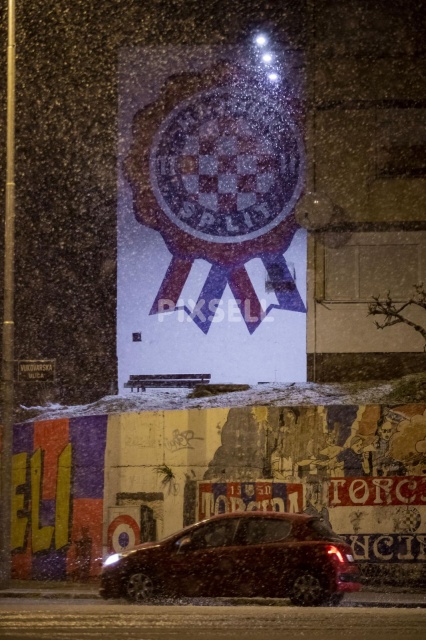
Miroslav Lelas / PIXSELL
The peak of the ice wave hit Dalmatia last night at around 9 pm. Snow fell on the entire Split area, including Kaštela. In Inland Dalmatia and Dugopolje, the snowfall was up to 20 centimeters!
In Kaštel Gomilica, there was a real snowstorm with hurricane gusts of bura wind up to 120 km / h. Snow also fell along the coast in Vodice, Šibenik, and Brela, reports Dalmacija Danas.
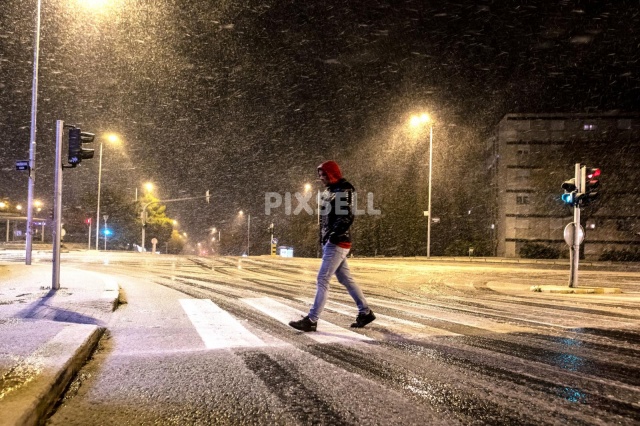
Miroslav Lelas / PIXSELL
Due to strong gusts of wind on the Dinara, the cold was as high as -24 degrees. As the snow fell, the temperature dropped to 0, which is also one of the record low temperatures for Dalmatia at this time of year.
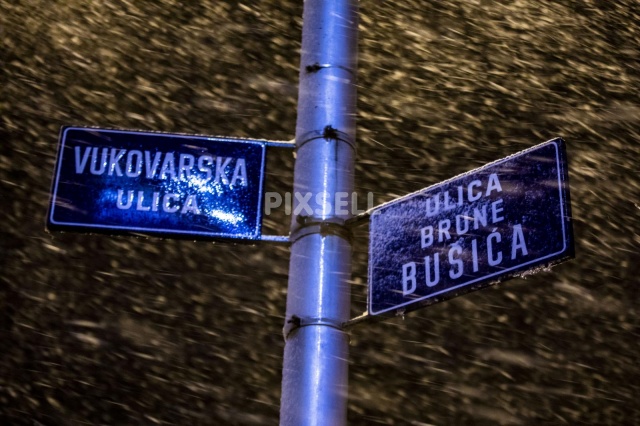
Miroslav Lelas / PIXSELL
Southern Croatia does not remember when the last snow fell in April.
And although it was only a symbolic snow cover, it is the first known snow cover in Split in April in known history, reports Dalmacija Danas.
Until this morning, Dalmatia was cut off from the rest of Croatia. Last night from 10 pm, all traffic from the interior to Dalmatia and vice versa for all categories of vehicles was prohibited, and only this morning at 6 am did traffic open, however only for personal vehicles to the junction Sveti Rok and then state roads through Gračac, Obrovac, and Karin.
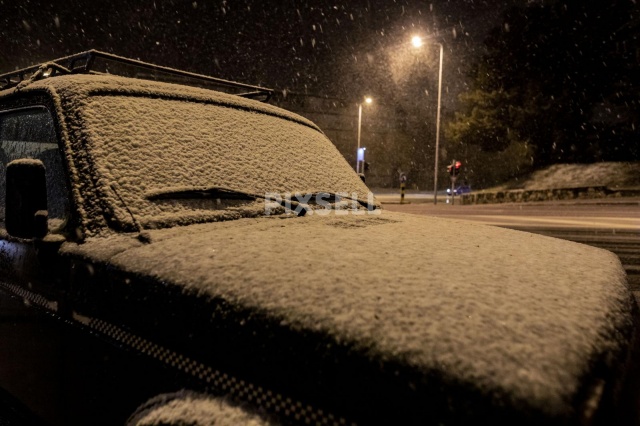
Miroslav Lelas / PIXSELL
There is still no passable road to Dalmatia for delivery vehicles, buses, trucks, trucks with trailers, and tractors with semi-trailers, and HAK warns drivers not to drive if they do not have to.
While we wake up to sunny skies on Wednesday morning, at least those of us in Split can say that we experienced a historic meteorological night!
For more about lifestyle in Croatia, follow TCN's dedicated page.
No FlyDubai Flights to Zagreb this Summer, Flights to Dubrovnik Canceled for 2021
April 7, 2021 - The latest flight news for Croatia as there will be no FlyDubai flights to Zagreb until September 1, 2021, and none to Dubrovnik at all this year.
Croatian Aviation reports that the low-cost company from the United Arab Emirates will not resume traffic between Zagreb Airport and Dubai this summer.
FlyDubai had initially announced that it would resume traffic between Dubai and Zagreb in the summer flight schedule in 2021, as a replacement for Emirates, which has permanently withdrawn from the same route due to the pandemic.
The airline originally planned to resume traffic beginning the year, and flights were then delayed from month to month. The last announcement from the airline was that the traffic on this line would be resumed from the end of May, but as of today, all flights have been canceled until September 1 this year.
The airline was to offer 57,000 seats between Dubai and Zagreb in the summer of 2021, however, significantly less than in 2019 when Emirates operated on this route with a B777-300ER wide-body aircraft and an average capacity of 358 seats per flight. Recall, in 2019, more than 152 thousand seats were available on this line.
Apart from the smaller capacity, the Dubai - Zagreb line will also no longer have a first-class seat offer for which Emirates is world-famous. The number of offered seats in business and economy class is also drastically reduced.
But Zagreb isn't the only victim this summer, as all planned flights between Dubai and Dubrovnik for this year have also been canceled. Recall, Flydubai planned on operating the Dubai - Dubrovnik route from May 13, twice a week, on Thursdays and Sundays. From June 25, the airline was to add a third weekly flight (Fridays), with scheduled flights until the end of September.
FlyDubai's return to Zagreb on September 1 is not yet certain. If the airline is not able to fill its capacity on narrow-body aircraft in the summer months, then the occupancy of this line is even riskier after September 1, when demand is usually lower.
As a reminder, in the summer months of 2019, Emirates connected Zagreb and Dubai daily with wide-body aircraft type B777-300ER, while FlyDubai operated on the same route in the winter months.
Nevertheless, the return of Flydubai to Zagreb will eventually enable Emirates passengers to continue their journey to Zagreb with a partner company.
Follow the latest on flights to Croatia HERE and the latest travel updates and COVID-19 news from Croatia HERE.
For more on travel in Croatia, follow TCN's dedicated page.


